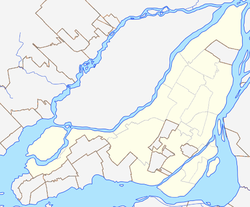Victoria Bridge, Montreal
|
Victoria Bridge Pont Victoria |
|
|---|---|

Victoria Bridge as viewed from upstream, from Montreal Technoparc
|
|
| Coordinates | 45°29′30″N 73°31′45″W / 45.49165°N 73.52912°WCoordinates: 45°29′30″N 73°31′45″W / 45.49165°N 73.52912°W |
| Carries | |
| Crosses |
St. Lawrence River and Saint Lawrence Seaway |
| Locale | Saint-Lambert, Quebec and Montreal, Quebec (Neighbourhood of Victoriatown) |
| Characteristics | |
| Design |
|
| Piers in water | 24 |
| Clearance above | (?) |
| Clearance below | (?) |
| No. of lanes | 2, one each on either side of the rail bridge |
| Rail characteristics | |
| No. of tracks | 2 |
| Track gauge | 1,435 mm (4 ft 8 1⁄2 in) standard gauge |
| Structure gauge | AAR |
| Electrified | No |
| History | |
| Opened | August 25, 1860 |
The Victoria Bridge (French: Pont Victoria), previously known as Victoria Jubilee Bridge, is a bridge over the St. Lawrence River, linking Montreal, Quebec, to the south shore city of Saint-Lambert.
Opened in 1859, originally as a tubular bridge designed by Robert Stephenson, the bridge was the first to span the St. Lawrence River, and as such is an important historic bridge in Canada. It remains in use to this day, carrying both road and rail traffic, with rails in the middle and roadways (part of Route 112) on both sides. It is actively used by the Canadian National Railway on its Halifax to Montreal main line. It is a major contributor to Montreal's role as a continental hub in the North American rail system. Its designation for the Canadian National Railway (CNR commonly known as CN) is Mile 71.40 Subdivision St-Hyacinthe.
Originally named the Great Victoria Bridge in honour of Queen Victoria, it was officially rededicated as the Victoria Jubilee Bridge following renovations in 1897 (A.D. MDCCCXCVII). It was returned to the name Victoria Bridge (Pont Victoria) in 1978.
The bridge is approximately 3 kilometres (1.9 mi) long, and includes 24 ice-breaking piers.
The Victoria Bridge was erected between 1854 and 1859. Prior to the construction of the bridge, it was difficult and at times impossible to cross the St. Lawrence River during the long winter season, as freezing and thawing in the fall and spring made for treacherous conditions. Crossings took place by boat during the summer, and by walking or riding a sleigh or cart over the frozen river in winter, along routes cleared of snow to facilitate passage.
...
Wikipedia

